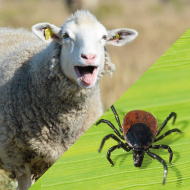
Tick may have been carried over from birds from Scandinavia
Scientists at the University of Glasgow have identified an exotic tick-borne parasite within Scottish sheep.
Writing in the journal Emerging Infectious Disease, researchers say this is the first time this organism - Babesia venatorum (B.venatorum) - has been detected in animals in the UK. It is also the first time the tick has been identified in sheep anywhere in the world.
Researchers collected blood samples from cattle, sheep and deer from northeast Scotland - an area where tick-borne diseases have previously been detected. They found DNA from the B. venatorum parasite in the blood of a large number of sheep that were not showing any sign of the disease.
The authors say the discovery raises concerns for public health and farming. But while the tick may be more virulent than species of Babesia usually found in the UK, it is thought to have a low risk to human health.
“The presence of B. venatorum in the UK represents a new risk to humans working, living, or hiking in areas with infected ticks and livestock, particularly sheep,” explained Dr Willie Weir, senior university clinician in veterinary pathology, public health and disease Investigation.
“Although we believe the threat to humans to be low, nevertheless local health and veterinary professionals will need to be aware of the disease if the health risk from the tick-borne disease in the UK is to be fully understood.”
B. venatorum causes babesiosis, a rare tick-borne disease that has been recognised as an emerging disease in humans. It has been extensively recorded in China and Europe in the last 20 years, with two confirmed human infections in Italy.
Scientists believe the B. venatorum tick may have been carried by migratory birds coming into the UK from Scandinavia.
“Our study reveals that sheep can be a natural host for B. venatorum in the UK, which is surprising since we believed roe deer to be the main mammalian host for this parasite in Europe,” said first author Dr Alex Gray.
“Given our findings, ongoing active surveillance of this parasite in UK livestock would be useful to fully understand the prevalence and transmission of the disease, as such information may be critical for controlling the spread of babesiosis.”
The discovery of B. venatorum follows the recent discovery of tick-borne encephalitis virus in the UK.



 With Strangles Awareness Week just around the corner (5-11 May), vets are being encouraged to share a survey about the disease with their horse-owning clients.
With Strangles Awareness Week just around the corner (5-11 May), vets are being encouraged to share a survey about the disease with their horse-owning clients.